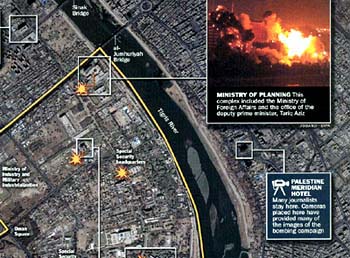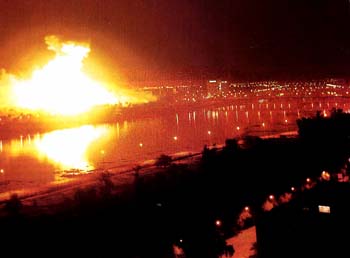 |
War against Terrorism
Moral Criteria for Just War... - Part IV
The Traditional Teaching Also Applies to the
New Way of Waging War
Atila Sinke Guimarães
Two main factors contributed to the nuclear danger: the existence of two international super-powers, the U.S. and the U.S.S.R. which engaged in the arms race, and the lack of control in the use of atomic weapons as in Hiroshima and Nagasaki. To be precise, one should add a third factor that makes the use of this weapon possible even though not probable: the fact that many nations have nuclear weapons and can employ them.
End of the race of arms
With the dismantling of the Berlin Wall in 1989 and the consequent fall of the Iron Curtain caused by the growing discontent of the peoples in the communist world, what came to light was the startling social, political, and economical weakness of the so-called second super-power, the U.S.S.R. Was it ever a real super-power or did it simply deteriorate rapidly? To such a question a clear answer has not been given until now. The reality, however, is apparent to all: the U.S.S.R. fell apart and today Russia militarily cannot compete with the U.S. The nuclear arms race ended, and the principal factor threatening a nuclear war disappeared.
War destruction diminished considerably
The problem of indiscriminate destruction in the use of weapons also seems to have changed considerably.

U.S. strikes were able to destroy specific targets in a city of 5 million without damaging neighboring structures. Above, mapping out the targets. Below, a target is hit and destroyed, while the surrounding buildings stand in Baghdad
Time, March 21, 2003
 |
In fact, the precision of the missiles carrying bombs in the two Gulf Wars (1991 and 2003) points to a solution for excessive damages of the future war. The impressive low number of civilian causalities in these two wars and the successful destruction of military targets without damage to nearby buildings are facts that cannot be carelessly dismissed by moralists and war critics. The consequence is that an international castigation can be made, and a country militarily defeated and quickly taken, without either using nuclear weapons or inflicting a tremendous harm on the civilian population, as happened before in the two World Wars of the 20th century. This factor changes the character of the war; as a result, this kind of warfare does not deserve the same degree of moral censure as the wars of the previous phases.
A nuclear attack becomes much more improbable
The precision of the missiles carrying conventional weapons also has an enormous consequence for a possible nuclear war. It can be summarized in a single question: If the U.S. military has achieved such a high level of precision that it can destroy in air the enemy missiles carrying conventional bombs, could it not also destroy in air eventual enemy missiles carrying nuclear bombs? The reply is affirmative: Yes, it has shown its capacity to do this, and while its precision may not yet be complete, it seems to be moving quickly in this direction. Then, if one nation cannot launch its nuclear weapons against another, when the latter is supported by the U.S., the nuclear power of the offender nation is locked within its own borders. Hence the international nuclear danger among nations diminishes enormously.
What is the moral position of the Conciliar Church?
In face of the present day changes regarding the end of the nuclear arms race, and the way of waging war, what has been the position of the progressivist religious authorities in the Catholic Church?
They remain blind to any kind of political or military changes and clamor against any war with the same utopian slogans that John XXIII, Paul VI, and many Prelates used in their times. Never again war! Never again war! They also continue to present an atomic danger in today’s war as imminent, when this is not true. Finally, they continue to insist as indispensable on the necessity for nations to submit to a universal government for resolving cases of war, when it is obvious that this need does not exist. In summary, they scandalously flaunt untruths in order to support their propaganda and continue their attack against war.
Before the two Gulf Wars, were they really sincere in their claim of concern for the safety of humankind and its possible destruction? If so, why did they show no relief when this danger was proven to be much less than what had been predicted, or even nonexistent? Their silence in face of the changes analyzed above is quite suspicious, and raises a serious question about their sincerity.
Final appraisal
Since these religious authorities choose to deny the reality of changed circumstances, they cannot be taken seriously.

Protesters present a dramatic portrayal of devastation that doesn't exist in the contemporary war - The Tidings, February 21, 2003 |
Why did the Vatican take such a violent and unintelligent approach against war? The decision of the U.S. and U.K. to go to war with Iraq, disregarding the advice of the U.N., contested its authority and consequently jeopardized the existence of this organization, so cherished by the Conciliar Church. This could be one reason. Also the predictable future success of the initiative would put the Vatican – as it really did – in an extremely uncomfortable position. Furthermore, with this military success, the realization of its dream of peace would be postponed sine die. So, it would be understandable that some Prelates would lose their psychological bearings and enter into a sort of feminine hysteria.
The traditional Catholic moral principles on just war that I summarized in this article are still entirely in effect. Further, they apply perfectly to the two Gulf Wars, to each one for different reasons. Regarding the first, the military allies went to war to protect Kuwait against an unjust invasion by Iraq. Regarding the second, the U.S. was justly defending itself against a country that hosted terrorist groups, which were being prepared for actions against America and other countries of the West, as I have already explained.
Posted June 20, 2003

  |
This argument is developed in Guimarães’ book War, Just War

|
Part 1 | Part 2 | Part 3
War | International Affairs | Hot Topics | Home | Books | CDs | Search | Contact Us

© 2002- Tradition in Action, Inc. All Rights Reserved
|
 |
|